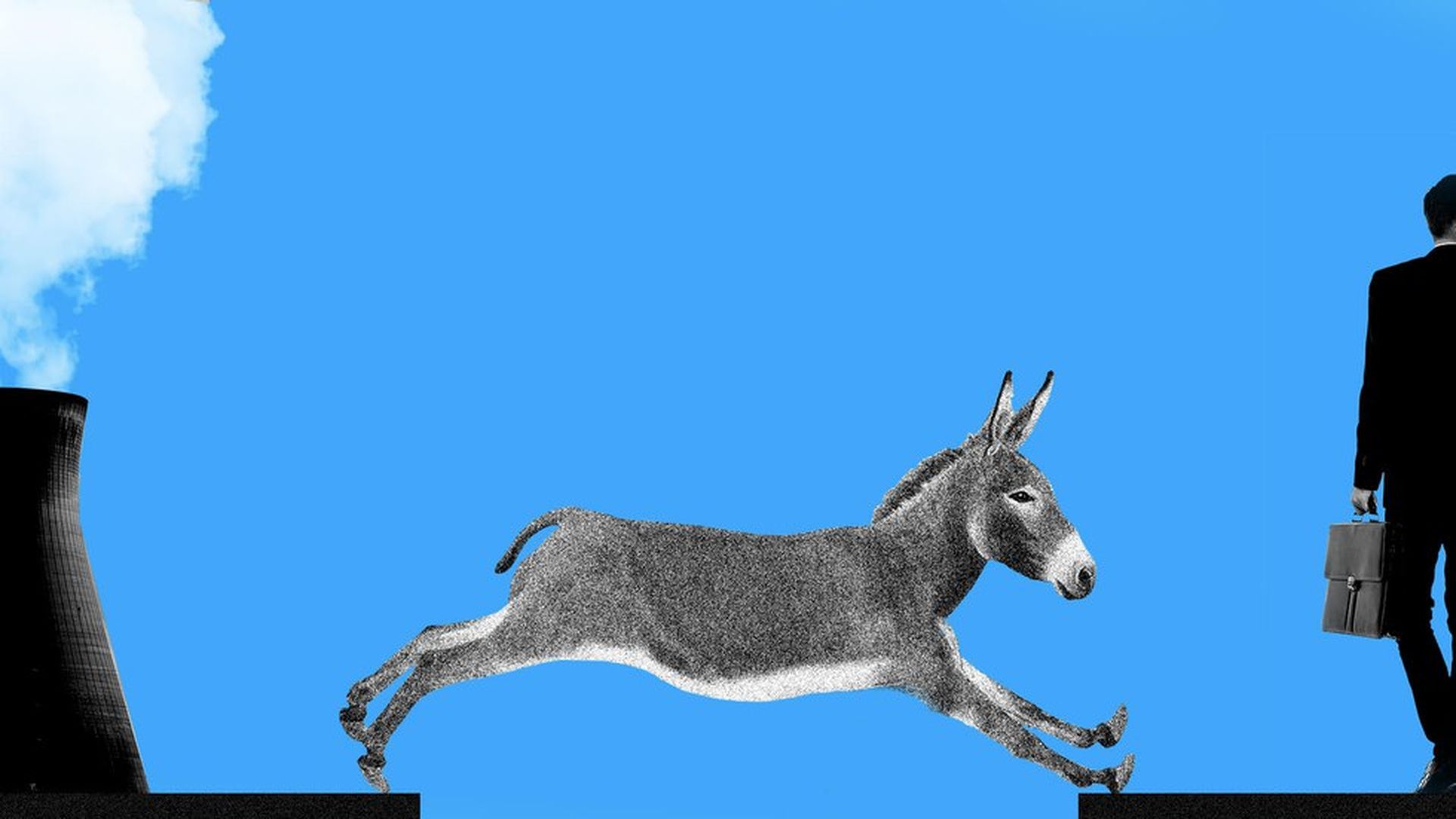What liberals get wrong about climate change
Add Axios as your preferred source to
see more of our stories on Google.

Rebecca Zisser / Axios
Democrats and environmental groups too often let their ideological agendas get in the way of addressing climate change.
My thought bubble: Republicans are the bigger sinners in this debate because most of them refuse to acknowledge that climate change and humans' role driving it is a real thing, as I wrote in my column last week. The left faces an inherently different and trickier problem than the right's rejection of the science: Their tactics and messaging are hobbling their push to address climate change.
To be sure, "the left" is broad and diverse, so much of what I say here can't apply to each and every elected Democrat or environmental group. Looking at the left broadly though, I see three big problems with their approach.
1. Renewables-only mindset
Beltway Democrats and green groups have increasingly backed renewables at the expense of technologies that economic modeling says will be needed to tackle climate change to the extent scientists say is needed.
This includes carbon-free nuclear power, technology that captures carbon emissions from power plants and other industrial facilities and even natural gas, a fossil fuel that burns 50% cleaner than coal and helps balance out wind and solar when it's not windy or sunny.
"There is denialism on the left that is different than denialism on the right," said Josh Freed, vice president of clean energy at Third Way, a centrist think tank. "It ignores data that is inconvenient to ideology."
We've seen this play out most prominently during the Democratic presidential primary race between Hillary Clinton and Bernie Sanders. Clinton moved left, seeking to match her opponent's progressive policies. Then-President Obama also tacked more toward renewables and against natural gas in his last years in office.
Some Democrats are beginning to call out environmental groups for not backing nuclear power, while cautious support is slowly building for carbon capture technology. These shifts are subtle and often get drowned out by vocal critics of these positions.
In an op-ed a couple weeks ago, Rep. James Clyburn, the No. 3 Democrat in the House, said his state may need to increase its fossil-fuel dependence in the wake of construction on two new nuclear reactors being halted.
"For some reason, most environmental groups that demand action on climate change were rather muted as the pitched battle over the efficacy of this project raged on, and a few groups have even cheered the shutdown," Clyburn wrote.
Several environmental groups and liberal Democrats have backed legislation, recently introduced by moderate Democrat Sen. Heidi Heitkamp of North Dakota, ramping up expiring tax credits for carbon capture technology. But the most influential grassroots environmental groups, like the Sierra Club and 350.org, are not supporters.
2. Messaging that alienates
Many climate activists, aided by left-leaning media coverage, paint doomsday scenarios and call for unrealistic policy prescriptions that are ineffective at raising concern among people not already worried about climate change.
A recent example of this was the highly cited July New York magazine article by David Wallace-Wells, "The Uninhabitable Earth," which was criticized by some of the most vocal climate scientists as being over-the-top and inaccurate.
Activist and 350.org founder Bill McKibben also recently wrote in Rolling Stone that the only way to tell if lawmakers are committed to climate change is if they oppose all fossil fuels in support of renewables. He has a point that widely adopting natural gas won't help curb global carbon emissions in the long-run to the levels scientists say are needed, but demanding such a high bar will turn off more politicians than it will convince.
Some on the left say that conservatives are still denying climate change if they don't adopt the common progressive mindset that climate change is not only real, but the world's biggest problem that needs urgent, sweeping government action.
That's a black and white construct unfit for a complicated, scientific, policy problem with implications stretching centuries. It also won't convince anyone. The debate stemming from the Charlottesville tragedy is black and white. Climate change is not.
3. Seeking perfection when good is enough
Democrats and environmentalists often seek to build large, diverse coalitions to push climate policies that end up being a vehicle for a hodgepodge of varied issues. Then they crumble under their own weight.
We saw that last year in Washington state when a carbon tax ballot measure failed. Social justice and environmental groups opposed it because they wanted the revenue to be used for particular projects, like renewable energy and mass transit.
Then-President Obama's top climate adviser, Carol Browner, also said recently that the 2010 climate bill that Congress considered might have passed if it was smaller.
This country is a long ways from debating concrete proposals again, so I'll save a fuller debate on this part for another time.
